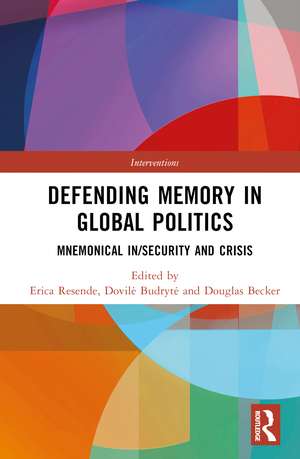Defending Memory in Global Politics: Mnemonical In/Security and Crisis: Interventions
Editat de Erica Resende, Dovilė Budrytė, Douglas Beckeren Limba Engleză Hardback – 27 ian 2025
Instead of focusing exclusively on national identities and state actors, it explores various identities, including substate and transnational actors, and their role in “defending memory” during times of crisis. Embracing a broad definition of conflict that includes mnemonic, societal and armed conflicts, the expert contributors engage with political trauma, demonstrating its power to evoke commemorations and other shared practices of collective remembrance, shaping and perpetuating collective memory, the construction of national and transnational identities, national interests and foreign policy behaviors.
The book contributes to the fields of memory and trauma studies and ontological security in international relations. It will also be of interest to scholars and students of political science, sociology, international relations, history, nationalism and identity, international studies, cultural geography, social psychology, cultural studies and anthropology.
Din seria Interventions
-
 Preț: 297.78 lei
Preț: 297.78 lei -
 Preț: 311.88 lei
Preț: 311.88 lei -
 Preț: 309.41 lei
Preț: 309.41 lei -
 Preț: 319.01 lei
Preț: 319.01 lei -
 Preț: 327.40 lei
Preț: 327.40 lei -
 Preț: 156.44 lei
Preț: 156.44 lei -
 Preț: 128.80 lei
Preț: 128.80 lei - 9%
 Preț: 1041.06 lei
Preț: 1041.06 lei -
 Preț: 112.30 lei
Preț: 112.30 lei -
 Preț: 123.84 lei
Preț: 123.84 lei -
 Preț: 302.16 lei
Preț: 302.16 lei -
 Preț: 286.65 lei
Preț: 286.65 lei -
 Preț: 310.45 lei
Preț: 310.45 lei -
 Preț: 111.26 lei
Preț: 111.26 lei -
 Preț: 312.36 lei
Preț: 312.36 lei -
 Preț: 309.70 lei
Preț: 309.70 lei -
 Preț: 311.48 lei
Preț: 311.48 lei -
 Preț: 371.71 lei
Preț: 371.71 lei -
 Preț: 279.25 lei
Preț: 279.25 lei -
 Preț: 189.29 lei
Preț: 189.29 lei -
 Preț: 302.99 lei
Preț: 302.99 lei -
 Preț: 342.06 lei
Preț: 342.06 lei -
 Preț: 443.86 lei
Preț: 443.86 lei - 18%
 Preț: 1055.06 lei
Preț: 1055.06 lei - 18%
 Preț: 1008.17 lei
Preț: 1008.17 lei - 25%
 Preț: 880.72 lei
Preț: 880.72 lei - 18%
 Preț: 1057.05 lei
Preț: 1057.05 lei - 18%
 Preț: 1001.90 lei
Preț: 1001.90 lei -
 Preț: 411.42 lei
Preț: 411.42 lei - 18%
 Preț: 1005.04 lei
Preț: 1005.04 lei - 18%
 Preț: 703.61 lei
Preț: 703.61 lei - 18%
 Preț: 1108.73 lei
Preț: 1108.73 lei - 18%
 Preț: 699.96 lei
Preț: 699.96 lei - 18%
 Preț: 1005.04 lei
Preț: 1005.04 lei -
 Preț: 409.69 lei
Preț: 409.69 lei - 18%
 Preț: 1055.32 lei
Preț: 1055.32 lei - 18%
 Preț: 1114.30 lei
Preț: 1114.30 lei - 18%
 Preț: 1056.00 lei
Preț: 1056.00 lei -
 Preț: 393.90 lei
Preț: 393.90 lei - 18%
 Preț: 1113.95 lei
Preț: 1113.95 lei - 18%
 Preț: 1111.72 lei
Preț: 1111.72 lei - 18%
 Preț: 1053.79 lei
Preț: 1053.79 lei -
 Preț: 393.93 lei
Preț: 393.93 lei - 18%
 Preț: 1059.48 lei
Preț: 1059.48 lei - 26%
 Preț: 822.36 lei
Preț: 822.36 lei -
 Preț: 416.26 lei
Preț: 416.26 lei - 18%
 Preț: 1282.19 lei
Preț: 1282.19 lei
Preț: 1005.51 lei
Preț vechi: 1104.96 lei
-9% Nou
Puncte Express: 1508
Preț estimativ în valută:
192.41€ • 201.39$ • 160.14£
192.41€ • 201.39$ • 160.14£
Carte tipărită la comandă
Livrare economică 31 martie-14 aprilie
Preluare comenzi: 021 569.72.76
Specificații
ISBN-13: 9781032378169
ISBN-10: 1032378166
Pagini: 272
Dimensiuni: 156 x 234 mm
Greutate: 0.66 kg
Ediția:1
Editura: Taylor & Francis
Colecția Routledge
Seria Interventions
Locul publicării:Oxford, United Kingdom
ISBN-10: 1032378166
Pagini: 272
Dimensiuni: 156 x 234 mm
Greutate: 0.66 kg
Ediția:1
Editura: Taylor & Francis
Colecția Routledge
Seria Interventions
Locul publicării:Oxford, United Kingdom
Public țintă
Postgraduate and Undergraduate AdvancedCuprins
Introduction: The Securitization of Memory in the Context of Crisis Part 1: States Defending Memory 1. Securitizing the Past in Colombia? The Mnemonical Disputes over the Taking of the Palace of Justice in 1985 2. The Controversies of Memory Politics in Authoritarian Chechnya 3. The Securitization of Memory and the Practice of Public History in the Baltic States 4. Memory Contestation and Violence: The Battle over the US Civil War Narrative and Variations of Mnemonic In/Security 5. Framing, Naming, and Claiming Cultural Heritage in Nagorno Karabakh/Artsakh: Mass Media and Cultural Heritage as Mnemonic Battlegrounds Part 2: Non-State Actors Defending Memory 6. When Memory Is Not Defended: Precarity and Political Imprisonment in Myanmar 7. Contesting Memories in and of Bhutan: Diaspora Radio as a Mnemonic Challenge 8. Speaking for the Dead in Brazil: Mothers as Memory Activists for Justice and Change 9. Trauma Visualization: The Role of Transnational Actors in the Mnemonic Preservation and Promotion of Holodomor Narratives in Canada 10. Russian Securitization of Memory and Multiple Anxieties: Defending Memory through the Diasporic Film Haytarma 11. Gender, War and Remembrance: ‘Heroic Subjects’ in Lithuania’s Memory Regime of Fighting and Suffering 12. Conclusion: Defending Memory at the Frontiers of War in Europe
Notă biografică
Erica Resende is Assistant Professor of International Relations and Security Studies at the Brazilian War College, in Rio de Janeiro, Brazil.
Dovilė Budrytė is Professor of Political Science and International Studies at Georgia Gwinnett College, USA, and a member of EUROPAST project at Vilnius University, Lithuania.
Douglas Becker is Associate Teaching Professor in the Departments of Political Science and International Relations, and in Environmental Studies at University of Southern California Dornsife, USA.
Dovilė Budrytė is Professor of Political Science and International Studies at Georgia Gwinnett College, USA, and a member of EUROPAST project at Vilnius University, Lithuania.
Douglas Becker is Associate Teaching Professor in the Departments of Political Science and International Relations, and in Environmental Studies at University of Southern California Dornsife, USA.
Descriere
This book explores the securitization of memory in times of crisis using overlooked cases from the Global South and the Global North.
